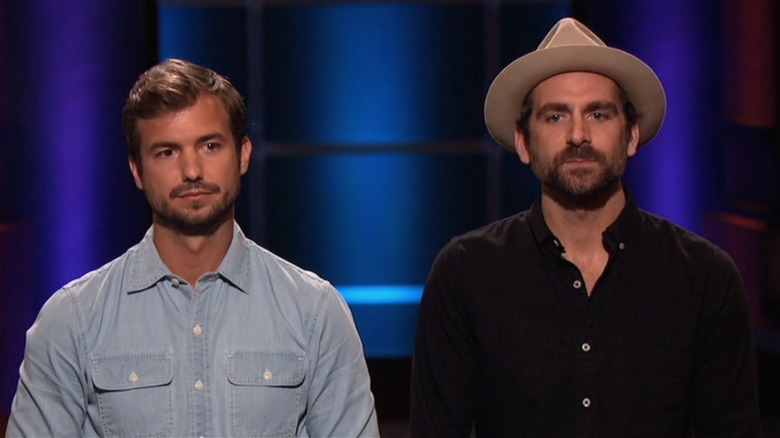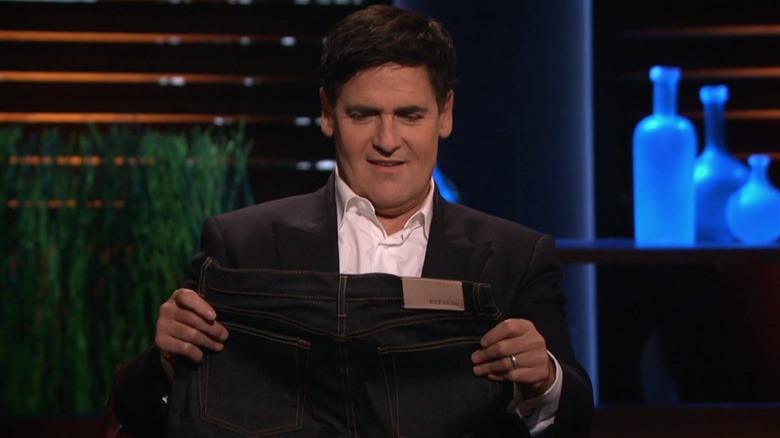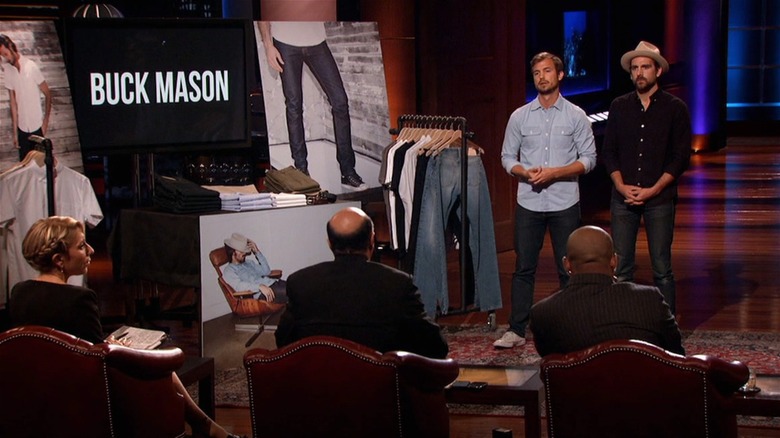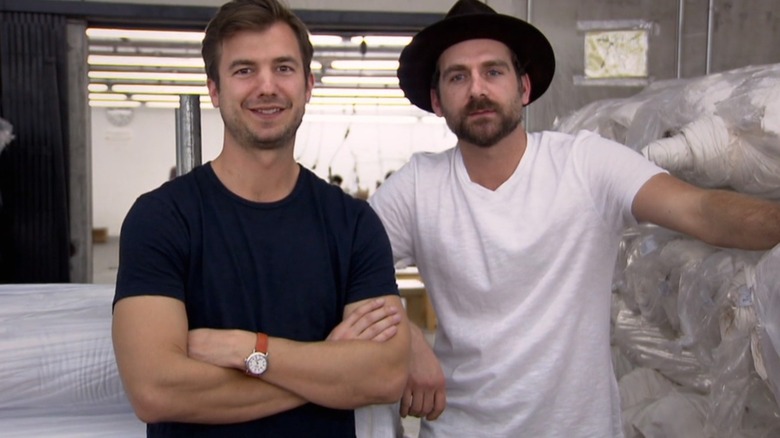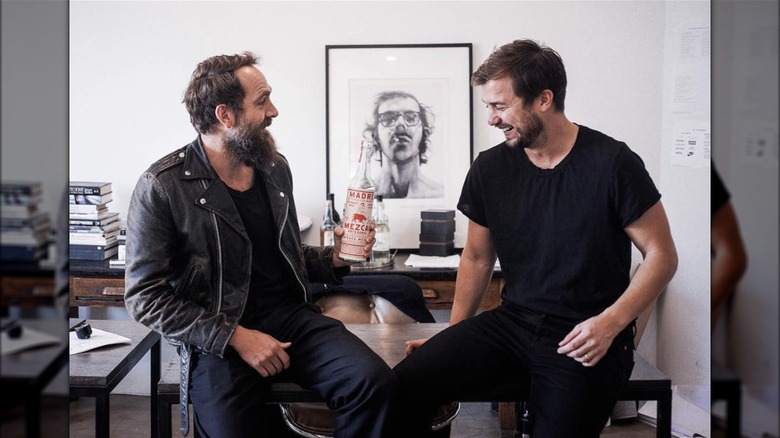Whatever Happened To Buck Mason After Shark Tank?
When Erik Allen Ford and Sasha Koehn launched their menswear brand, Buck Mason, in 2013, they were hardly interested in fashion. "There is a group of men who want to look great but don't necessarily care about fashion or trends," Ford told Huffington Post in 2015. "They want to invest the least amount of time possible to achieve a sophisticated, cool style; they probably aren't reading fashion blogs or style magazines."
Ford's main inspiration was his dad, a Missouri brick mason who wore the same thing every day — blue jeans, t-shirts, and flannels — and looked effortlessly cool doing it. With Buck Mason, Ford and Koehn aim to focus on similar classic styles while streamlining the shopping process. "We wanted to simplify the male wardrobe to a clean, effortless style that we felt could stand the test of time," Koehn continued. "Our designs are derived from classic American staples that men feel comfortable in."
And when Koehn says American, he means it. A central tenet of Buck Mason is that the clothes are American-made, with all the tradition and craftsmanship that implies. As Koehn said in the introduction to the pair's Season 6 "Shark Tank" appearance, "The idea of not having a personal relationship with the craftsmen making our jeans, making our shirts, just doesn't make sense to us."
Buck Mason and Shark Tank weren't a perfect fit
Erik Allen Ford and Sasha Koehn's "Shark Tank" pitch reflects the Buck Mason ethos: simple, unadorned, and to the point. The duo enters the Shark Tank seeking $200,000 for 8% equity in Buck Mason and trots out some of their signature tees, denim, and Oxford shirts. "They're cool now," Koehn says of the classic styles, "they'll be cool 50 years from now."
The co-owners explain the sales model is direct-to-consumer, sold mainly on the Buck Mason website. Customers can buy single items or opt for curated packages of three to six pieces — an ideal setup for indecisive shoppers who want ready-made outfits. At $135 for jeans, $24 for t-shirts, and $88 for button-down shirts, Buck Mason's clothes aren't the cheapest on the market, but Ford and Koehn insist that for durable, American-made products, they're a great value. Customers seem to think so too. Buck Mason has netted $300,000 in sales in eight months, and 38% of their customers reorder again. Of that 38%, 10% have repurchased more than three times.
Nevertheless, the Sharks have their misgivings. Not wanting to get involved in retail, Mark Cuban and Lori Greiner drop out. Daymond John thinks the company's valuation is too high and exits as well. Kevin O'Leary offers $200,000 for 50%, though that's too big a share for Ford and Koehn. Robert Herjavec offers $200,000 for 25% plus a $100,000 line of credit, but the guys turn him down too. They ultimately leave "Shark Tank" without a deal.
The Buck Mason founders have no regrets turning down the deal
When Buck Mason's "Shark Tank" episode aired in 2015, many fans were flabbergasted that they didn't take the deal. Sasha Koehn and Erik Allen Ford were confident they were worth more than the Sharks thought. "It was an enticing offer," Koehn told Cleveland.com. "We both really like Robert and were excited that he came back in with that, but we were still giving up too much equity for our first round of funding."
The co-founders were also looking beyond only "Shark Tank" to find funding and, as Ford said in the episode, "build something that we could give to our children." Koehn continued in his Cleveland.com interview, "We were eight months old at the time of this filming and were actively looking to raise a seed round of funding. 'Shark Tank' was just another channel for capital on top of several other meetings we were taking, albeit a crazy one."
The duo may have turned down the deal, but they did benefit from the so-called "Shark Tank" effect in the two weeks after their episode aired. During a three-day period, sales went up 6,300%. At the brick-and-mortar Buck Mason location near Venice Beach, revenue rose by 500%. Buck Mason continued to thrive after the "Shark Tank" glow dissipated.
Buck Mason has exploded since Shark Tank
"I was humbled by a t-shirt — brought to the brink by the all-American staple," Erik Allen Ford told Forbes in 2018. Since Ford and Sasha Koehn started producing their spin on the t-shirt in 2013, Buck Mason has exploded, earning glowing write-ups in GQ, The Cut, and Men's Health. Its inventory has exploded, too. The humble menswear company now offers outerwear, polos, shorts, and sweaters, among countless new additions. The tasteful designs and high quality have also courted celebrity fans like Patrick Dempsey, Ryan Gosling, and Chris Pratt.
Buck Mason's brick-and-mortar operations have expanded as well. As of this writing, there are nearly 30 store locations in the United States and more on the horizon — an impressive number for a company built on e-commerce. "Brick and mortar retail is more profitable than e-commerce," Ford said in the same Forbes interview. "Both divisions need to be profitable and strong, but e-commerce drives brick and mortar as much, or more, than brick and mortar drives e-commerce." In the spring of 2022, Buck Mason made its biggest leap yet and launched its women's collection, helmed by Ralph Lauren alum Tess Sullivan.
Buck Mason has made some necessary changes over the years, including its pricing. T-shirts now start at $45, and jeans at $148.
What's next for Buck Mason?
2023 was a busy year for Buck Mason, and the brand is showing no signs of slowing down. In April, Buck Mason debuted a vintage collection, which includes a 1966 Rolex Submariner, a 1960s-era flight jacket, and art books that feature the works of Isamu Noguchi and Richard Serra. The company hopes to do vintage drops quarterly. The collection was a long time coming — Buck Mason began culling together a vintage archive for design inspiration around 2016.
In October, Buck Mason launched a limited edition collaboration with Eddie Bauer. For the cozy line of winter wear, Buck Mason explored the Eddie Bauer archives and chose a select few pieces to upgrade, with prices for the collection starting at $85.
The most significant acquisition for Buck Mason is perhaps the company's new sewing factory in Mohnton, Pennsylvania, and cloth mill in nearby Shillington. The shirt factory had closed after 100 years when its owner, Stitch Fix, ceased operations and let go of its five dozen workers. "A few months prior, we had decided to build a new t-shirt factory in Dallas, Texas, next to our vertical distribution center," Erik Allen Ford recalled on the Buck Mason website. "But here was an existing, fully functional version of what we aimed to build." Ford and Koehn rehired 17 workers when they reopened the factory, which now produces 10,000 t-shirts a month.
